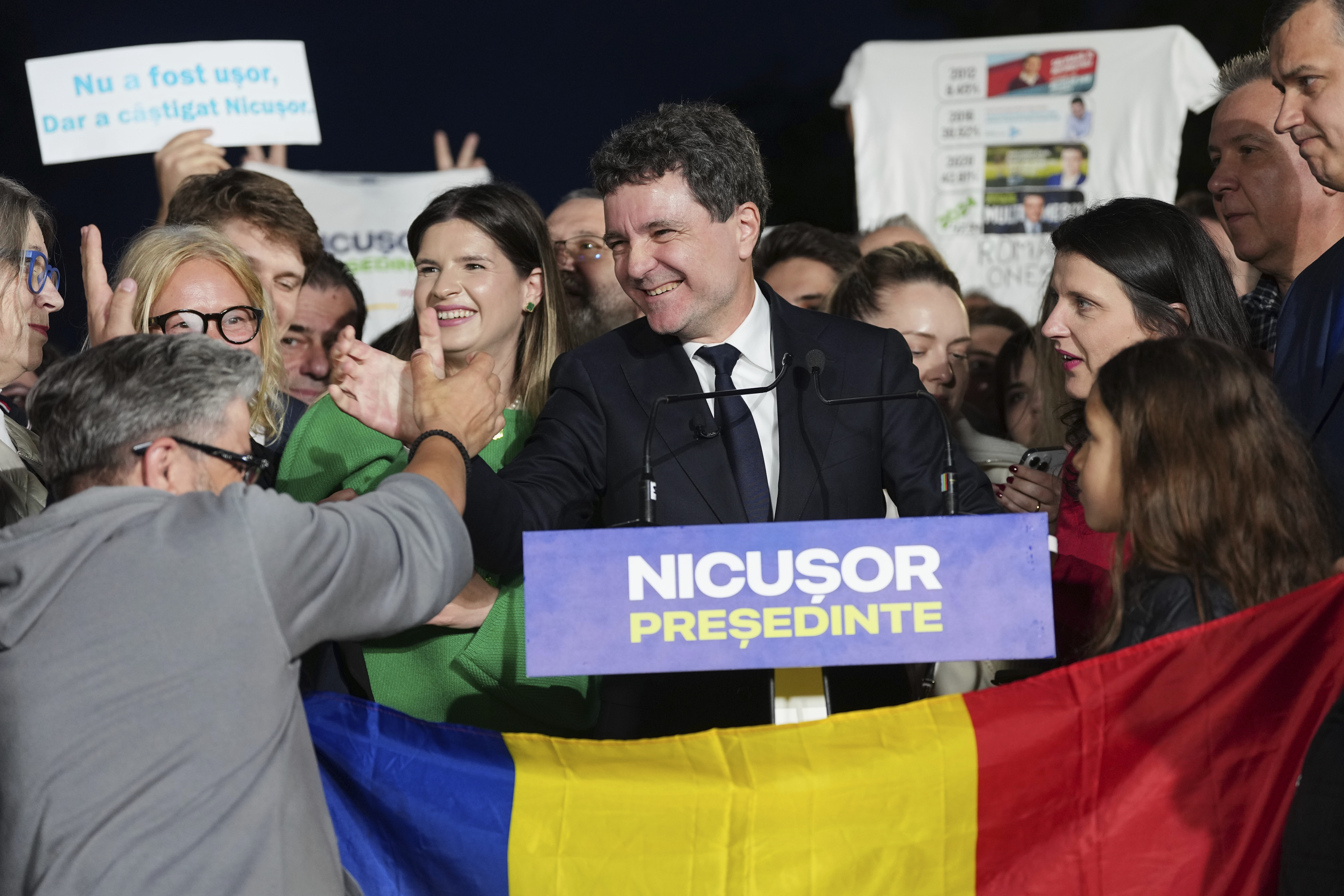Elections in Romania
Pro-Europe Signal from Bucharest: Romania Votes against a Moscow course

In Rumänien hat der proeuropäische Kandidat Nicușor Dan die Präsidentschaftswahl gewonnen.
© picture alliance / ASSOCIATED PRESS | Andreea AlexandruIndependent candidate Nicușor Dan won Sunday's runoff election in Romania's presidential election with 6,168,642 votes (53.60%) against George Simion of the far-right AUR party, who received 5,339,053 votes (46.40%). Voter turnout was 64.72%, with a total of over 11.6 million Romanians casting their ballots, including 1.64 million abroad. In the first round of voting two weeks earlier, only 53% of eligible voters had participated. In the two weeks leading up to the runoff, there was a massive mobilisation across all democratic sections of the population, especially in urban areas, which led to Nicușor Dan's success.
Domestically, Nicușor Dan received 55.16% of the votes, while George Simion received 44.84%. Abroad, however, Simion was ahead with 55.86% to Dan's 44.14%. Simion's lead was particularly clear in Germany, where 278,291 Romanians voted. There, Simion received 68.31%, while Dan only received 31.69%. While Simion won more districts in rural areas of Romania (22), Dan's support was stronger in urban and western-oriented regions. He won particularly well in districts such as Harghita, Covasna and Cluj. Dan also prevailed among Romanians in Russia, Kazakhstan, India, Japan and other Asian countries, winning 58.65% of the vote in Russia.
Domestic political implications
After the first voting trends were announced, Dan gave a victory speech, called for unity and announced that he would prioritise the budget deficit, the security situation and the formation of a government. He has also already named the favourite for the office of Prime Minister: the incumbent interim president Ilie Bolojan of the National Liberal Party PNL. Dan expressed openness to talks with all democratic parties, even though he pointed to tensions within the socialist PSD, which now tends to shy away from government responsibility despite being blamed for both the botched elections and the enormous budget deficit of around 9-10%. Dan is in favour of a stable grand coalition with four parties. The liberals from Union for the Salvation of Romania (USR), the Foundation's partner party, have already publicly expressed their interest in joining the government. The Hungarian Minority Party (UDMR) is also likely to join the government. Dan is expected to take office on 26 May.
In front of the campaign headquarters, Dan mingled with the cheering crowd and called on citizens to actively participate in politics and society. In an emotional speech, he thanked everyone who had fought for change and emphasised that Romania needs new people in politics. Addressing the diaspora, he declared that Romania would always be there for them.
George Simion initially declared himself the winner of the election, but officially conceded defeat a few hours later. In a video message, he congratulated Nicușor Dan and thanked the more than five million Romanians who supported him. At the same time, he announced that he would continue his political fight - for justice, Christian values and the natural family. He emphasised that AUR (Alliance for the Union of Romanians) will remain a significant part of Romanian society, which suggests that he will continue to promote division in society.
Foreign policy implications
George Simion, candidate of the extremist AUR and visibly supported by Donald Trump's entourage and indirectly by Moscow, had openly announced that he would end Romania's support for Ukraine, adopt Orbán's Hungarian course and withdraw from the Western solidarity architecture. A victory for Simion would have shaken the EU in its most vulnerable flank. Romania has the longest border with Ukraine ,which crucial for military logistics, humanitarian aid and political support. A break with Bucharest's EU-Ukraine policy would have weakened Zelensky's position, strengthened Putin's room for manoeuvre and further destabilised the Republic of Moldova with its upcoming elections.
Russia was not the only country to have invested in Bucharest. The Trump-affiliated MAGA movement also saw Romania as a possible gateway for exporting its ideology. After setbacks in the parliamentary elections in Germany, Canada and Australia, George Simion was supposed to serve as a European outpost. However, his public appeal to the USA to exclude Romania from the visa programme, which has happened, provoked massive rejection from voters. A symbolic act that sealed his failure.
Dan's election victory reflects widespread rejection of authoritarian tendencies. Open support in the form of video messages from Paris, Warsaw and Chișinău demonstrated the international significance of this election. Emmanuel Macron, Maia Sandu and Donald Tusk were quick to offer their congratulations – not just out of courtesy, but because they have a genuine interest in a united, strong Europe.
This election was not a blank cheque for Nicușor Dan, but a decisive rejection of alienation from the EU. At a historic moment, Romanian society has taken responsibility – for its future, for Ukraine, for Moldova and for Europe. Simion's vision of a European MAGA network remains a fragment for now. In Poland, where elections are also coming up soon, it will become clear whether Bucharest's signal to defend liberal democracy will find imitators. But one thing is already clear: this election has successfully countered Moscow's influence in Romania.
